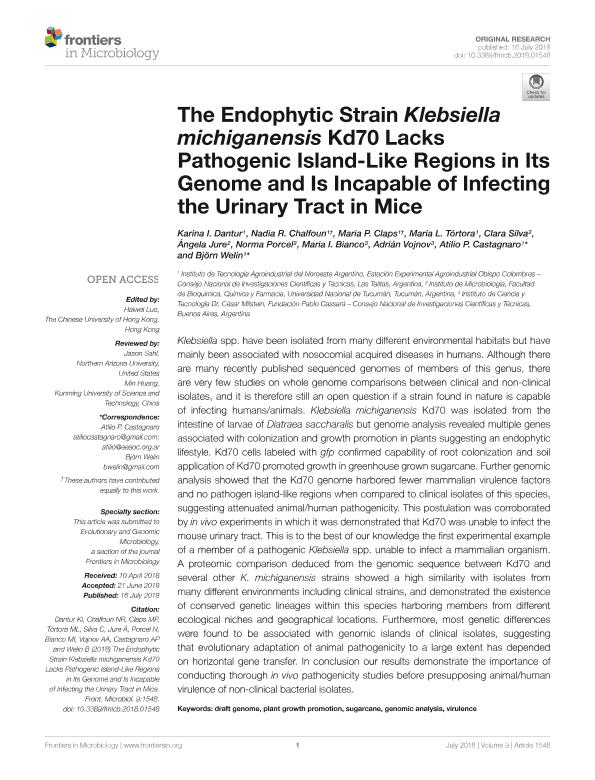Artículo
The Endophytic Strain Klebsiella michiganensis Kd70 Lacks Pathogenic Island-Like Regions in Its Genome and Is Incapable of Infecting the Urinary Tract in Mice
Dantur, Karina Ines ; Chalfoun, Nadia Regina
; Chalfoun, Nadia Regina ; Claps, María Paula
; Claps, María Paula ; Tortora, Maria Laura
; Tortora, Maria Laura ; Silva, Clara; Jure, Maria Angela; Porcel, Norma Dolores; Bianco, María Isabel
; Silva, Clara; Jure, Maria Angela; Porcel, Norma Dolores; Bianco, María Isabel ; Vojnov, Adrián Alberto
; Vojnov, Adrián Alberto ; Castagnaro, Atilio Pedro
; Castagnaro, Atilio Pedro ; Welin, Bjorn
; Welin, Bjorn
 ; Chalfoun, Nadia Regina
; Chalfoun, Nadia Regina ; Claps, María Paula
; Claps, María Paula ; Tortora, Maria Laura
; Tortora, Maria Laura ; Silva, Clara; Jure, Maria Angela; Porcel, Norma Dolores; Bianco, María Isabel
; Silva, Clara; Jure, Maria Angela; Porcel, Norma Dolores; Bianco, María Isabel ; Vojnov, Adrián Alberto
; Vojnov, Adrián Alberto ; Castagnaro, Atilio Pedro
; Castagnaro, Atilio Pedro ; Welin, Bjorn
; Welin, Bjorn
Fecha de publicación:
16/07/2018
Editorial:
Frontiers Media SA
Revista:
Frontiers in Microbiology
ISSN:
1664-302X
Idioma:
Inglés
Tipo de recurso:
Artículo publicado
Clasificación temática:
Resumen
Klebsiella spp. have been isolated from many different environmental habitats but have mainly been associated with nosocomial acquired diseases in humans. Although there are many recently published sequenced genomes of members of this genus, there are very few studies on whole genome comparisons between clinical and non-clinical isolates, and it is therefore still an open question if a strain found in nature is capable of infecting humans/animals. Klebsiella michiganensis Kd70 was isolated from the intestine of larvae of Diatraea saccharalis but genome analysis revealed multiple genes associated with colonization and growth promotion in plants suggesting an endophytic lifestyle. Kd70 cells labeled with gfp confirmed capability of root colonization and soil application of Kd70 promoted growth in greenhouse grown sugarcane. Further genomic analysis showed that the Kd70 genome harbored fewer mammalian virulence factors and no pathogen island-like regions when compared to clinical isolates of this species, suggesting attenuated animal/human pathogenicity. This postulation was corroborated by in vivo experiments in which it was demonstrated that Kd70 was unable to infect the mouse urinary tract. This is to the best of our knowledge the first experimental example of a member of a pathogenic Klebsiella spp. unable to infect a mammalian organism. A proteomic comparison deduced from the genomic sequence between Kd70 and several other K. michiganensis strains showed a high similarity with isolates from many different environments including clinical strains, and demonstrated the existence of conserved genetic lineages within this species harboring members from different ecological niches and geographical locations. Furthermore, most genetic differences were found to be associated with genomic islands of clinical isolates, suggesting that evolutionary adaptation of animal pathogenicity to a large extent has depended on horizontal gene transfer. In conclusion our results demonstrate the importance of conducting thorough in vivo pathogenicity studies before presupposing animal/human virulence of non-clinical bacterial isolates.
Palabras clave:
DRAFT GENOME
,
GENOMIC ANALYSIS
,
PLANT GROWTH PROMOTION
,
SUGARCANE
,
VIRULENCE
Archivos asociados
Licencia
Identificadores
Colecciones
Articulos(ICT - MILSTEIN)
Articulos de INST.DE CS. Y TECNOLOGIA "DR. CESAR MILSTEIN"
Articulos de INST.DE CS. Y TECNOLOGIA "DR. CESAR MILSTEIN"
Articulos(ITA-NOA)
Articulos de INST. DE TECNOLOG. AGROINDUST. DEL NOROESTE ARGENTINO
Articulos de INST. DE TECNOLOG. AGROINDUST. DEL NOROESTE ARGENTINO
Citación
Dantur, Karina Ines; Chalfoun, Nadia Regina; Claps, María Paula; Tortora, Maria Laura; Silva, Clara; et al.; The Endophytic Strain Klebsiella michiganensis Kd70 Lacks Pathogenic Island-Like Regions in Its Genome and Is Incapable of Infecting the Urinary Tract in Mice; Frontiers Media SA; Frontiers in Microbiology; 9; 1548; 16-7-2018; 1-14
Compartir
Altmétricas



